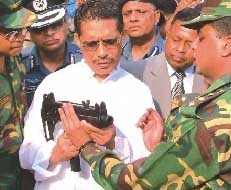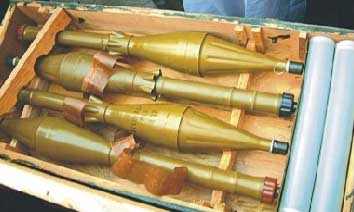Archives
Inside Bangladesh
Inside Bangladesh
Khaleda Zia Regime and ULFA
Bangladesh Nationalist Party (BNP) supreme Begum Khaleda Zia regime’s nexus with militant and terrorist groups is an open secret. It was during her  tenure as Prime Minister of Bangladesh from 2001 to 2006 that around 175 bases or camps of North East extremist outfits of India got all the buffering and protection.
tenure as Prime Minister of Bangladesh from 2001 to 2006 that around 175 bases or camps of North East extremist outfits of India got all the buffering and protection.
Besides this, Pakistan based terrorists and the ISI worked in tandem with Indian militants to carry out subversion and sabotage activities in the North East and beyond. This came out blatantly in the arrest and on going trial of Lutfozzaman Babar, who was the Home Minister in the Khaleda cabinet of the time, in a Chittagong court of the metropolitan magistrate.
In startling revelations made by him during his extensive grilling by security and intelligence agencies and the evidence placed before the court by competent authorities through counsels, it was revealed that Babar as Home Minister exercised undue influence over Rapid Action Battalion and intelligence wings to allow safe passage for huge consignments of arms, ammunition and explosives smuggled in by ULFA from international markets to reinforce and bolster its arsenal. The consignments consisted of ten truck loads of 27,000 grenades, 150 rocket launchers, over 11 lakh rounds of ammunition and 1100 sub machine guns. It was further revealed that the Home Minister even shielded the culprits involved in the biggest ever arms haul and tried to distort or obstruct investigations and destroy evidence. Ultimately, the case was kept under wraps. It was during the BNP rule that terrorism and militancy reached its dizzy heights, creating serious problems for India and causing bloodshed in Bangladesh itself which led to deep resentment among people in general. In the general elections of 2008, the Bangladeshi people gave a massive mandate in favour of the Awami League led alliance of Sheikh Hasina which was also their vote against the cult of violence unleashed during Khaleda’s leadership.
It was further revealed that the Home Minister even shielded the culprits involved in the biggest ever arms haul and tried to distort or obstruct investigations and destroy evidence. Ultimately, the case was kept under wraps. It was during the BNP rule that terrorism and militancy reached its dizzy heights, creating serious problems for India and causing bloodshed in Bangladesh itself which led to deep resentment among people in general. In the general elections of 2008, the Bangladeshi people gave a massive mandate in favour of the Awami League led alliance of Sheikh Hasina which was also their vote against the cult of violence unleashed during Khaleda’s leadership.
Sheikh Hasina after her return to power vowed to crack down on militants and terrorists and to reopen the case of the arms haul. Investigations revealed that the huge arms cache was unloaded at Chittagong port in April 2004 and then hidden in a warehouse which was detected by security men. The consignment of arms was brought in a ship owned by Salahuddin Quader Chowdhury, law advisor to Khaleda Zia and senior leader of BNP. The shipment of these arms from South Asian markets was finalised at a Bangkok meeting in March 16th, 2004 between the brokers and ULFA C-in-C Paresh Barua and his deputy Raju Barua. CID sleuths interrogating Babar came to know that some top officials in the government were well aware of the arms trafficking. Even more startling is the revelation that ULFA had bribed not only the top bureaucrats but also some high intelligence officials of the National Security Intelligence (NSI) and the Director General of Field Forces Intelligence (DGFFI). The sum paid was a mind-boggling $99.4 million.
Lutfozzaman however denied receiving any share of the ‘bribe-money’. Nor did he identify the higher ups in the bureaucracy and the intelligence setup. In  fact, two cases were filed in connection with the arms haul by security officials. CID restarted the cases in coordination with NSI and DGFFI. The Home Minister who was personally present to have a look at the arms in Chittagong then assured the initiation of action against those involved in helping ULFA to smuggle in the arsenal. But, he came under pressure from his own government not to proceed, he confessed during his interrogation. Sheikh Hasina according to her commitment has closed down the camps of not only ULFA but also of other militant groups and most of the leaders have been handed over to Indian authorities after detention.
fact, two cases were filed in connection with the arms haul by security officials. CID restarted the cases in coordination with NSI and DGFFI. The Home Minister who was personally present to have a look at the arms in Chittagong then assured the initiation of action against those involved in helping ULFA to smuggle in the arsenal. But, he came under pressure from his own government not to proceed, he confessed during his interrogation. Sheikh Hasina according to her commitment has closed down the camps of not only ULFA but also of other militant groups and most of the leaders have been handed over to Indian authorities after detention.
Jyotilal Chowdhury

